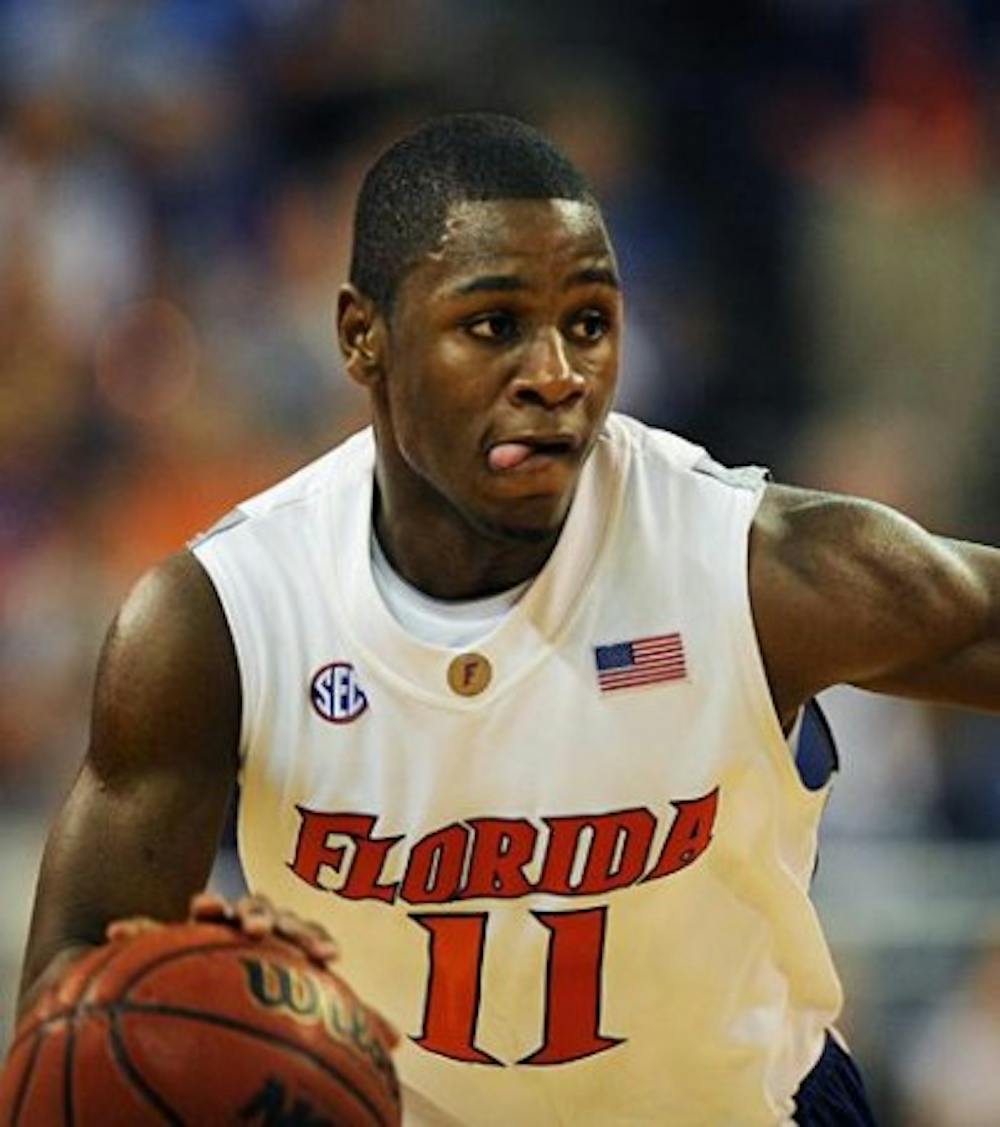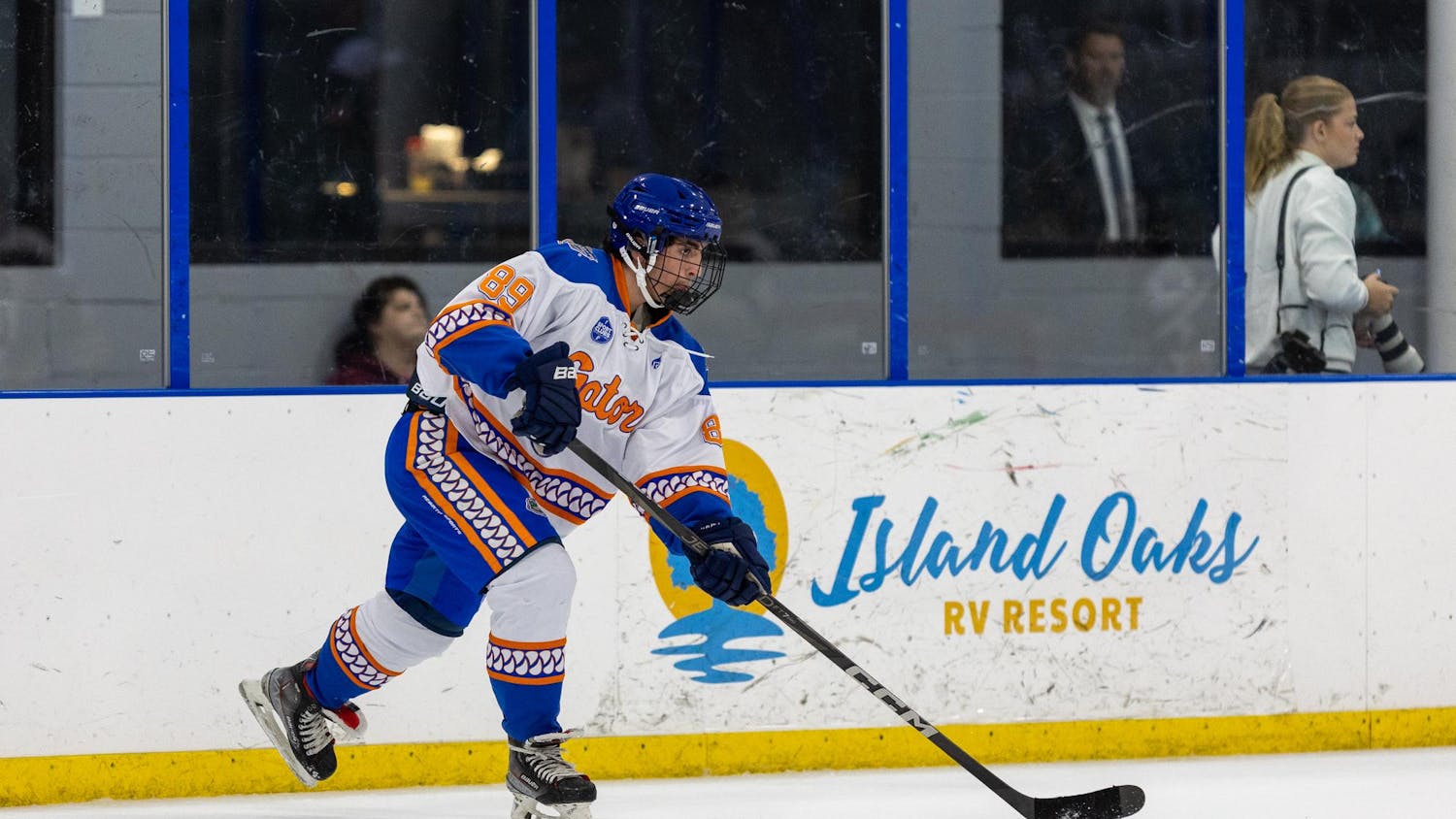At the intersection of Marion and Thomas S. Boyland streets in Brooklyn, N.Y., is the Marion Hopkinson Playground.
Circled by a black chain-link fence and surrounded by the city skyline, the court is stereotypical New York.
Pickup games run on the green-and-white asphalt from sun up to sundown.
Girlfriends and mothers sit on the park's wooden benches and watch while children too young to know any better shout profanities at each other and argue over fouls.
On the playground, no matter how old, every day is a chance to build a reputation.
For the kids who play there, it's an opportunity to maybe one day go to college. To maybe make it out of the circumstances they were born into.
For others, it's an escape. A chance to relive the glory the game once gave them.
To those who play there, Marion Hopkinson is the center of the basketball universe.
For Erving Walker, who grew up across the street in a two-bedroom apartment with his parents, Robert and Kim, it was nothing more than a distraction - just another pitfall that could have derailed his dream.
Walker never spent much time on that court. He never sat on these street corners. There was always too much to lose.
Instead, Walker's talent took him to the air-conditioned gyms and Catholic prep schools most of the kids on the playground would never see.
Brooklyn Boy
Walker and his parents lived in Brooklyn's Atlantic Towers section when he was a baby.
But Robert and Kim soon moved their son to the city's Brownsville neighborhood in search of a bigger space.
By age 3, Walker began following Robert to the pickup basketball games he played on Saturday and Sunday.
"Me and my dad have always been close, but basketball has definitely made us a lot closer," Walker said. "I always wanted to play with him - sometimes when I was too young for it."
Walker would watch Robert from the sidelines, basketball in hand. Before he was 4, Walker could shoot a full-size ball.
After each one of Robert's games, Walker would try shooting from a little bit farther from the basket than he did before.
By age 5, he could shoot the three.
"Like any little kid, he used to love to play with the ball," Robert said. "He's been playing ever since. It's been the biggest part of his life."
Walker soon began to play organized ball in the Bedford-Stuyvesant neighborhood youth programs.
"You couldn't play until you were 7. He was 5, but he was good enough, so they let him play," Robert said. "Not only was he good enough, but he was the best player on the team and one of the best in the league. That's when I knew he was going to be pretty good."
He quickly developed a penchant for making big shots.
"I was playing in a CYL (Catholic Youth League) … when I was 7," Walker said. "My dad was the coach, and it was a 9-and-under league. We were down 3, and I hit a three to send it into overtime," Walker said. "I've just always been confident in those situations."
By fifth grade, the year his team won the Amateur Athletic Union national championship, Walker started to garner attention by local scouts.
He was 4-feet-8-inches tall.
By age 11, Walker's basketball skills were good enough for him to play against kids almost twice his age.
Robert recalls Walker's cousins would take him to find older kids or even adults who were willing to bet Walker couldn't keep up.
Most of the time, it was a risky proposition.
"Because he was so small, the big kids thought they could gorilla him," Robert said. "He got used to getting banged around a little bit."
By seventh grade, Walker had practically become a basketball prodigy, mentioned in the same breath as Stephon Marbury and Sebastian Telfair - players considered to be hoops royalty in the city.
The only thing holding him back seemed to be his height. At the time, Walker was still shy of 5 feet.
His parents and scouts weren't too concerned. Robert is 6 feet tall. Kim, a former Brooklyn track star, is 5-foot-6. Everyone assumed a growth spurt was still coming.
"It's funny, we try not to talk about it," Robert said. "In the Walker household we've always hoped for a little growth spurt. One year he grew two or three inches. We thought that might be it, but it just never came."
Walker is now listed at 5-foot-8.
High school scouts became something of a fixture in Walker's life.
"They try a little bit of everything," Walker said. "They call you. They always try to be around."
Walker's talent gave him opportunities. But for Robert and Kim, it became hard to distinguish those who could help their son achieve his dreams from those who wanted to exploit him.
"There were people that tried, but we shaded that away, and it became kind of known that wherever he was at, we were at," Robert said. "We were careful. I was at 99 percent of his games and practices. We were always there, and we always protected him from all of that stuff. The ones that tried realized it was almost pointless."
Walker and his family eventually decided the best fit for the developing point guard was Christ the King Regional High School in Queens, N.Y.
Walker first met former Christ the King basketball coach Bob Oliva in the third grade when Walker attended the school's summer camp.
In Oliva's 27 years at the school, he coached Lamar Odom, Speedy Claxton, Jayson Williams, Omar Cook, Eric Barkley and Khalid Reeves - all future NBA players.
If Walker wanted to get to the next level, Christ the King was the place for him.
Walking Tall
By 16, Walker was taking a ferry to Staten Island three times a week to work out with trainer Jerry Powell, known as one of the city's best.
The Town Hall annex at Babylon, N.Y., was air-conditioned - except for the gym where Powell held daily workouts.
Big men dominated the court. There was United States Basketball League star Garnett Thompson. DePaul's Cliff Clinkscales and Fairleigh Dickinson's Cameron Tyler battled one-on-one almost daily.
There was even a slew of Sudanese high school players looking for a chance to get noticed by American colleges.
Walker was the youngest player at the workouts, and at 5-foot-6, he was also the smallest.
"Maybe I'll grow 5 inches taller and we'll see," Walker said. "Everybody wants to be a little taller, but I don't just sit there and wait for it. I play the cards I was dealt."
By the end of his senior year at Christ the King, Walker had led the school to a city championship and cemented his place as one of New York's best high school players.
After a heavy recruitment, Walker committed to play at UF for Billy Donovan.
"I was concerned as a coach recruiting a guy that small. I really was," Donovan said. "The first time I met him, I hadn't watched him play. I was like, 'Oh my gosh. My 7-year-old daughter could post him up. What am I doing here?'"
But Oliva, Donovan's childhood CYL coach, insisted there was more to Walker than most were willing to see.
"Bobby kept telling me, 'There's something about him,'" Donovan said. "He's got a great belief in himself. He's not afraid to take big shots. Some guys have surface confidence; they act like they're confident. Erving has a really deep internal confidence."
Soon after Walker's commitment, the Gators signed McDonald's All-American point guard Jai Lucas, a move that became necessary after the early departure of Taurean Green to the NBA.
Donovan worried the move might cause Walker to shy away from Gainesville.
"I told him, 'If you really feel like you need to reopen your recruitment and make a decision that is best for you, then I will understand,'" Donovan said. "He said, 'No, coach. Whenever I play, I will have to compete, and I have no problem going in there and competing, and this is where I want to go.' I really respected and admired that because I think that shows a lot in a player."
Maybe it's the Brooklyn in Walker, but the 5-foot-8 point guard didn't blink.
"I was in kind of a similar position in high school. When I was in eighth grade, Christ the King had a guy, Malik Boothe - he goes to St. John's now - in a worst-case scenario," Walker said. "I figured that we could just play together at some point. I just wanted to battle. I'm not going to back down from a challenge."
Soon after his arrival in Gainesville, Lucas opted to transfer to Texas. As for Walker, he has become the Gators go-to reserve this season, averaging 10 points per game and easing any concern Donovan once had about the point guard's size.
Disproving Doubters
As much as he has tried, Walker has never been able to escape the criticism. From the time he was in youth league, skeptics have looked for reasons why he wouldn't make it - his ability is always in question because of his height.
The doubters said he would never crack the varsity team at Christ the King. Then they argued he would never be more than a role player. And surely even as good as the high school star was, major college ball was just a dream.
But Walker has never fit into the mold others have cast for him.
In the summer of 2007, when some of the nation's top high school talent was brought to Harlem's Rucker Park for the Elite 24 showcase game, Walker was left off the main roster.
Instead, he was one of the two or three fill-ins - a local replacement for some of the big-name no-shows.
He was almost lost in the crowd at 155th Street. The fact that he was the smallest player on the court wasn't.
Walker opened the game by missing a layup. On the next possession he got his shot blocked.
Unwilling to allow the doubters the satisfaction of his misfortune, Walker fought back, knocking down several threes and leaving his mark on the game.
"I love when somebody looks down on me or thinks it'll be easy," Walker said. "If they
lose some of their edge, that just makes it easier for me. And why not have it easier?"
Even now that the sirens and screams of the city have been replaced by the calm of a small college town, Walker finds himself at the butt of jokes.
"When I first met him, I thought he was the new manager," Chandler Parsons said.
Even senior Walter Hodge admits to taking a few cheap shots at the freshman's expense.
"Every time we joke with him, he never gets sensitive or anything like that," Hodge said.
And why would he?
When it comes to ridicule, Walker's been through worse.
The jokes linger, but it's the sound of the silence that has been the hardest adjustment for a kid used to the constant motion of the city.
"It's a much slower life," Walker said. "New York is fast-paced. Things close much earlier down here. There's an adjustment."
But just like a boy from Brooklyn, the sound of a bouncing ball and squeaking rubber soles never changes - whether it's under the street lights of Marion Hopkinson Playground or the bright lights of the O'Connell Center.






